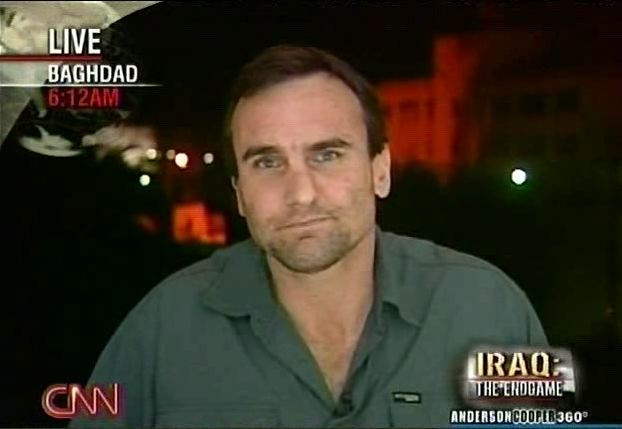AC: al-Qaeda "far from marginalized."

Click photo to play
Length: 4:22
(Note: There was a transmission glitch for a few seconds;
I have spliced in the footage from the replay.)
ANDERSON COOPER: Now to Iraq and a tragic case of good news and bad news -- the good news is, 18 people have been arrested in connection with a killing rampage that left 70 people dead this week in the city of Tal Afar. The bad news, those 18 people are Iraqi police officers.
Grimmer still, Tal Afar is the town that President Bush once championed as a success story.
For more, we turn to CNN's Michael Ware in Baghdad.
Michael, 18 police officers arrested in connection with these reprisal killings of 70 Sunnis in Tal Afar. But "The New York Times" reports that the 18 Shia officers were freed after being held for just a few hours.
If that's true, what does that say about what's going on in Tal Afar and all across Iraq?
MICHAEL WARE, CNN CORRESPONDENT: Well, what that is doing, Anderson, is reaffirming the sectarian divide within the government ranks here, particularly within the ranks of the Iraqi police service and their national police commandos.
Indeed, in Tal Afar, this has long been a problem. Now, Tal Afar is a small ancient city right up on the Syrian border. It's about 75 percent Sunni. That's why al Qaeda was able to, at first, get its toehold. So, there's a 25 percent Shia population.
Now, the U.S. is banking on that Shia population. And they have supported them in the police service and in the government up there in that small town.
Now, when about 80 people were killed on Tuesday in al Qaeda suicide bombings, that night, these police ran amuck, slaughtering about 70 Sunnis in retaliation. So, they had been arrested by their own government and then immediately released, according to the reports. This just confirms what everyone else has seen everywhere else across the country. This is just another facet of the civil war.
COOPER: Last year, President Bush used Tal Afar as an example of security success. Let's play that tape.
(BEGIN VIDEO CLIP)
GEORGE W. BUSH, PRESIDENT OF THE UNITED STATES: The military success helped against the terrorists helped give the citizens of Tal Afar security. And this allowed them to vote in the elections and begin to rebuild their city.
The terrorists, those who offer nothing but destruction and death, are becoming marginalized.
(END VIDEO CLIP)
COOPER: Well, that was then. This is now.
What happened in the interim?
WARE: Well, I was actually in that battle.
Tal Afar was owned by al Qaeda. It was a chief gateway for its foreign fighters coming in from Syria, and then distributed out across Iraq itself. And I was there when the 3rd Armored Cavalry Regiment and the Green Berets I was with went in and took it back.
No one ever believed it would then be free of violence. That city still remains in the hands of the so-called government forces, the forces we have seen who conducted the reprisal killings. So, it has not returned to al Qaeda.
But to imagine that you can just wipe out the al Qaeda presence or wipe out al Qaeda's ability to attack in Tal Afar is nonsensical. Indeed, look at Baghdad itself, with tens of thousands of American and Iraqi troops in this huge surge operation. The one thing that really continues, almost without hindrance, are the al Qaeda suicide attacks.
COOPER: Is al Qaeda becoming more emboldened? I mean, it seems like the number of their attacks is increasing, or at least getting more intense in recent weeks. Is that a conscious strategy on their part, or is it just that the other violence has lessened, so we're noticing it more?
WARE: Well, under the banner of the Islamic State of Iraq, which is what al Qaeda has declared large parts of this country, they have said that in response to the Baghdad security plan, the surge, they were going to up the ante.
Now, presumably, these waves of suicide strikes are part of that process of confronting the security plan, or countering it. But what we're seeing is, al Qaeda is under pressure in all sorts of places. We're seeing Anbar tribes being used by American forces to contract out the fight against al Qaeda. We're seeing continued arrests of some of its leadership.
Nonetheless, strategically, al Qaeda is still emboldened, brave enough, emboldened enough to be able to declare its so-called Islamic state. And, yes, its attacks continue. Its flow of fighters continue. It might be under stress, but it's far from marginalized.
COOPER: Michael Ware, appreciate the reporting. Thanks, Michael.
